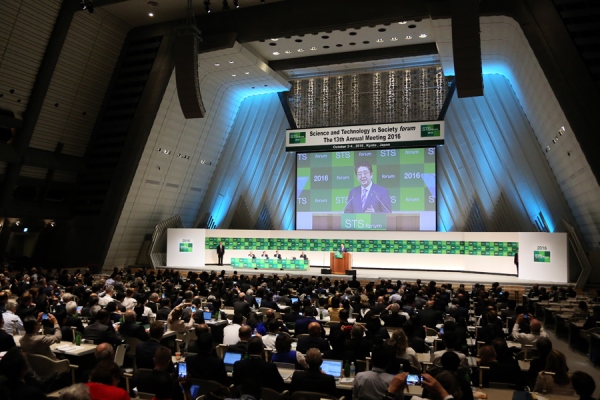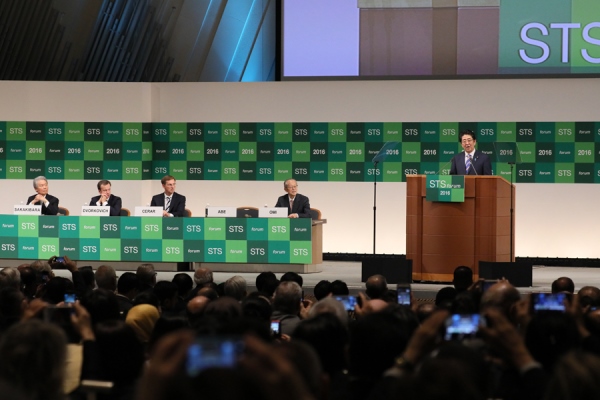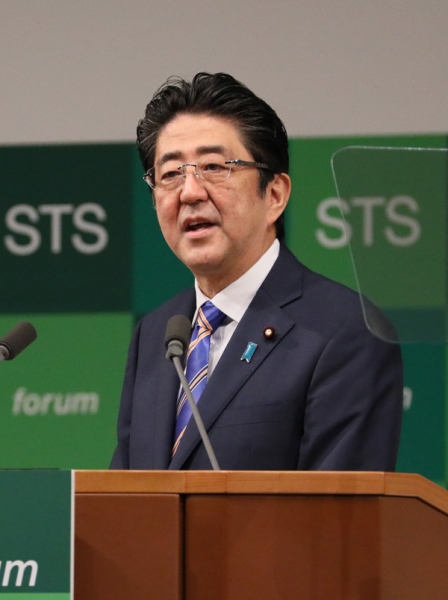Home > News > The Prime Minister in Action > October 2016 > Science and Technology in Society (STS) forum
The Prime Minister in Action
Science and Technology in Society (STS) forum
October 2, 2016
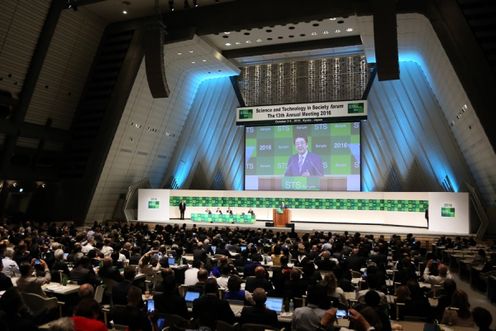
Photograph of the Prime Minister giving an address (1)
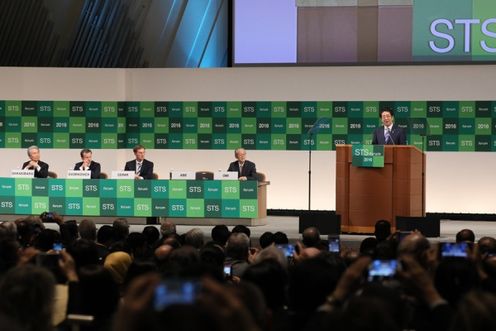
Photograph of the Prime Minister giving an address (2)
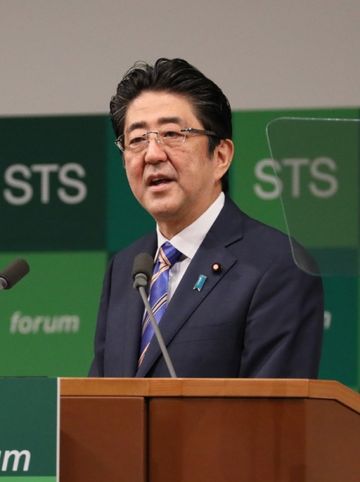
Photograph of the Prime Minister giving an address (3)
[Provisional Translation]
Prime Minister Shinzo Abe attended the 13th Science and Technology in Society (STS) forum Annual Meeting held in Kyoto, where he delivered an address.
The Prime Minister said in his address:
Chairman Omi, thank you very much for inviting me again. Distinguished guests, it's a pleasure to see you all.
I have come to join you so often that I have developed a habit ...a habit of mind, to ponder, come, September as I make my way to the UN General Assembly, how science and technology can make a difference in our societies, especially in Japanese society.
And the following is what I was thinking about on my way out, and on my way back, between Japan and the U.S.
I must first correct what I have just said. Because the question is NOT about how science and technology CAN make a difference in our society. Science and technology MUST do it.
Take diabetes, for example. You need to keep an eye on how high your blood sugar is before it's too late.
And it is exactly here that technology kicks in. Suppose your wristwatch set off an alarm each and every time your blood sugar level passed a certain point. Then you could choose to walk, jog, or eat less to bring it back to normal.
Its implications, of course positive, for our budget should be enormous. After all, we're spending as much as 10 trillion yen, which is more than our education budget, just tackling the illnesses ageing causes.
I, for one, would like to have a robot micro sensor always looking over my intestines to see how far I have gotten my Crohn's disease under control, which, by the way, I have been successful in doing thanks to the medicine I take. Actually, I am in such good shape that I even became Mario.
Wireless sensing technology also helps provide a watchful eye, 24/7, to those elderly under nursing care.
The aged and frail could suit up in robot armour suits to regain muscle power.
Speaking of science, medical science will surely scale new heights by mining big data collected in real time, with sensors communicating all the time with the cloud above.
In order for this to happen, doctors must be able to gather, and then analyse, such data with your signature on it. This is challenging. How best we can strike a balance between individual privacy and cyber security on one hand and scientific advancement on the other is something we are working on. We will work it out.
Science and technology, exactly as Chairman Omi believes, always help advance our societies. My point is, ladies and gentlemen, they must do a better job NOW than ever before.
Call it "Society 5.0," where science and technology play even more key roles in tackling challenges like ageing, sluggish productivity growth and enhancing well-being of humans, and that is what my government has chosen to aim for as a long term strategy.
A long, long time ago, we were all hunters, which was "Society 1.0." We then developed an agrarian society, "Society 2.0." "Society 3.0" was industrialization. And then the information age came, which ushered in "Society 4.0."
In contrast, under "Society 5.0," technologies of sensing, robotics, communication, big data and cloud computing all merge to solve the problems previously deemed unsolvable.
I must end my remarks with my usual note, which is about the power of women.
Earlier this year I chaired the G7 Summit in Ise-Shima, Japan. There, my colleagues and I issued the "G7 Guiding Principles for Capacity Building of Women and Girls," and "WINDS," which is “Women’s Initiative in Developing STEM Career.
In retrospect, no matter the age, hardly ever has a revolution come from the centre. It tends to come, almost always, from the periphery. In our still, shall we say, largely male-dominated societies, the hope is that new ideas, innovations, and something thus far unimaginable should emerge from female brain cells.
With that in mind, my government has put forth quite a number of new initiatives.
We all know who Isaac Asimov is. The great sci-fi author was also the father of a robot.
Guess what the robot in his novel did. It was not like an Iron man demolishing evil. The robot simply gave loving care to a young girl. It was the girl's best friend.
Ladies and gentlemen that is "Back to the future." A future around the corner.
Thank you so much.

